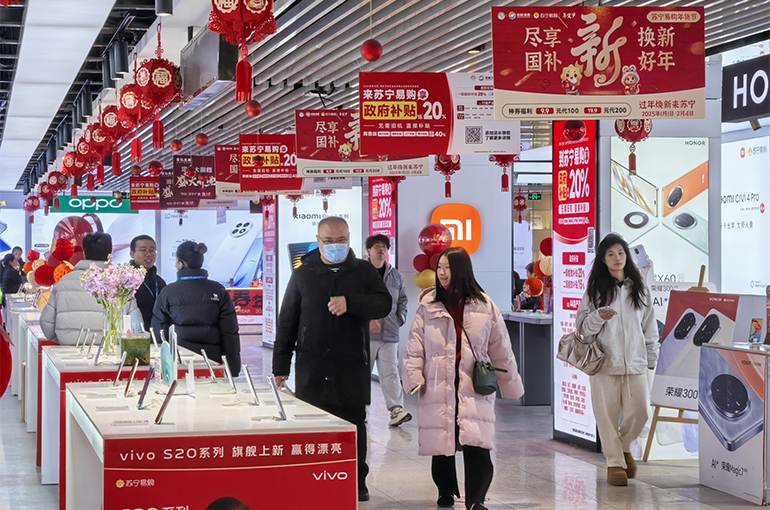 Phone Makers Strike Upbeat Note After China Includes Personal Devices in Consumer Product Trade-In Program
Phone Makers Strike Upbeat Note After China Includes Personal Devices in Consumer Product Trade-In Program(Yicai) Jan. 6 -- Handset makers such as Honor Terminal Device and Huawei Technologies expressed optimism after China’s state planner said it will expand the nationwide consumer goods trade-in program, which has so far applied to home appliances and cars, to include personal devices.
The National Development and Reform Commission announced on Jan. 3 that it would expand the large-scale equipment upgrade subsidy program to include the electronic information, industrial safety, and agricultural infrastructure sectors and bring mobiles, tablets, and smartwatches under the consumer electronics trade-in program. The two initiatives were introduced last March.
The move will bolster the ongoing recovery in the smartphone market, said Honor, the budget phone manufacturer spun off from Huawei four years ago. Companies will be able to fully leverage China's vast consumer market, while also needing to enhance their core competitiveness, it added.
Hu Baishan, executive vice president at Vivo Communication Technology, was similarly upbeat about the impact of the national subsidies, but also pointed out that the company has "managed expectations" internally, as similar subsidy policies have been implemented in various parts of the country already.
The national trade-in program can encourage consumers to spend on 3C digital products, namely computers, communication devices, and consumer electronics, and help domestic brands expand their market share, according to Huawei.
China's mobile phone shipments sank nearly 39 percent to 286 million units last year from 467 million units in 2016. This year, the market will see double-digit growth, thanks to the trade-in policy, said Chi Yingnan, China research director at Counterpoint.
“Half of Chinese consumers buy mid-range phones,” said Realme Vice President Xu Qi. The profit margin on Realme's Neo smartphone series is close to zero, so the trade-in program could help the firm improve its position in the competitive mid-priced segment, he added.
Other phone producers and industry experts believe the trade-in program will also help alleviate the pressure from rising supply chain costs. Buying subsidies will be a short-term catalyst for contract phone manufacturers and supply chain firms, according to a Morgan Stanley report.
According to a report by Citic Securities, the brands that will benefit most from the expanded trade-in program are those with large market shares, as well as upstream integrated circuit designers and capital-intensive component manufacturers, rather than midstream and downstream supply chain companies.
Several provincial-level regions, including Guangdong, Hainan, Jiangsu, and Tianjin have already begun subsidizing consumer electronic purchases under the trade-in program, while e-commerce platforms such as JD.Com and Alibaba’s Tmall have started rolling out related subsidies in various cities and provinces.
Offline channels and online platforms actively involved in the program will help develop more comprehensive ecosystems, said Zhu Jiatao, senior analyst at market research firm Canalys, adding that firms with a larger market share in the mid-to-high-range phone segment will reap the most benefit.
Editor: Futura Costaglione